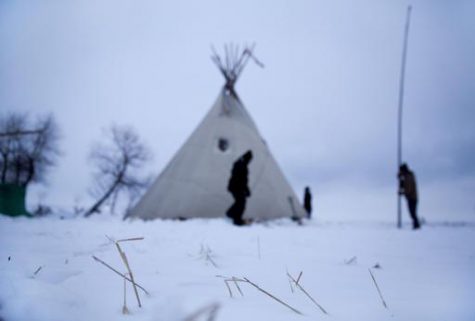Standing Rock Protests Continue
December 5, 2016
What is happening in Standing Rock, North Dakota?
Dakota Access, a part of the Fortune 500 company Energy Transfer Partner, is pushing to build a pipeline through the Midwest. The group received permit approval in January 2016 to begin construction on the pipeline that would span four states, starting in North Dakota. On its way through North Dakota, the pipeline is planned to go under the Missouri River.

The Missouri River is the Standing Rock Sioux Tribe’s main water source. They rely on it to sustain their way of life.
Pro-DAPL, a website dedicate to inform about the pipeline, backs the decision to route the pipeline through Standing Rock, saying it reduces the number of water crossings by 33. They also claim that many attacks on protesters have been provoked, saying that the water protectors tried to grab a can of mace, causing the police department to react accordingly.
“They’re right there. They have breached our sacred ground. There is no time for waiting any more,” said Cheryl Angel, a member of the Sicangu Lakota tribe, in an interview from The Guardian. “It is almost complete. All they need to do is go under that river.”
Since July 2016, protesters in North Dakota have been treated awfully, according to ABC News. More than 400 people have been arrested since the protests began. In early September, police dogs were released onto the protesters, biting 12 of them. While protesters have remained peaceful, police have used sound cannons, rubber bullets, concussion grenades, and tear gas.
The pipeline was initially planned to go north of Bismarck, North Dakota, but citizens blocked it over fear of contaminated drinking water. Now Dakota Access is attempting to do the same thing in Standing Rock, but instead they are using police force to make sure construction is completed.
According to the Chicago Tribune, the tribes have reason to be wary of the pipeline. Since 1995, there have been over 2 thousand significant accidents involving pipelines, which averages to 100 per year.
On October 20 this year, an oil well in North Dakota leaked over 67 thousand gallons of oil into a Missouri River tributary. Several days before, one thousand gallons were leaked in Pennsylvania.
And while the people gathering are trying to protect this from happening, conditions are getting worse and worse. Protester Sofia Wilansky may have to have her arm amputated after she received severe injuries resulting from a “non-lethal” grenade thrown by police early November 21, according to Free Thought Project.
Just hours before, policemen on the scene doused over four hundred protesters with water hoses in sub freezing temperatures. More than 300 protesters were treated for injuries that night, according to People’s World.
Police defended their use of the water hoses, claiming that the protesters were acting “very aggressive” and were trying to “breach” the bridge, according to the Washington Post. CNN on the other hand reported that the water hoses had a high chance of causing hypothermia and that the police were using potentially lethal methods against the peaceful protesters.
The protests continued through Thanksgiving, and while millions of Americans were at home enjoying their turkey and stuffing, a thousand protesters were still on the scene. Actress Shailene Woodley was among the protesters, stating that our children aren’t exposed to the horrific ways we have treated Native Americans.
“Thanksgiving was founded on a massacre,” Woodley said. “And yet we’re here with these cops, with snipers with rubber bullets, and I’m honest — I’m just sick of it. There is no excuse. Where is everyone? Why isn’t everyone standing up and saying something?”
According to RT News, officials are now blocking supplies like food and water from entering the protesters’ camps. Violators of the act will be subject to questioning and face up to a one thousand dollar fine.
The protests were set to continue as long as they could, but with the news of limited supplies, it’s questionable how long they will be able to continue.




joanne D. idzik • Dec 8, 2016 at 8:14 pm
I find this article to be very well-written and very informative. The reporter, Kieran Hogan, obviously dedicates much time to researching controversial issues such as this one and the Edward Snowden case.
Good job!